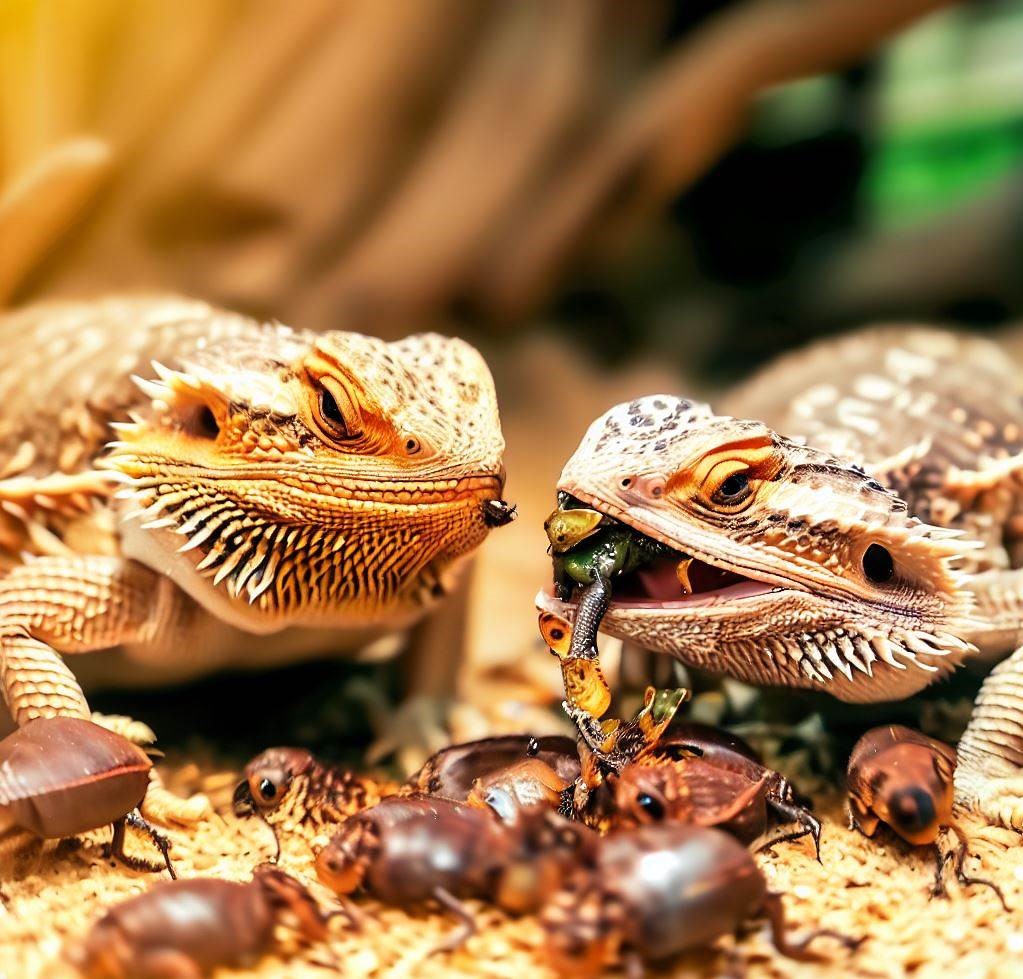For an inquisitive bearded dragon owner, the quest for providing a diverse and nutritious diet for our scaly companions is never-ending.
To that end, I often see owners ask “Can bearded dragons safely eat stink bugs?”
In this guide, we’ll explore why stink bugs aren’t an ideal food source for your dragon and discuss alternative options that you can consider for their meal plan.
Let’s get started!
Table of Contents
Overview Of Bearded Dragon Diet
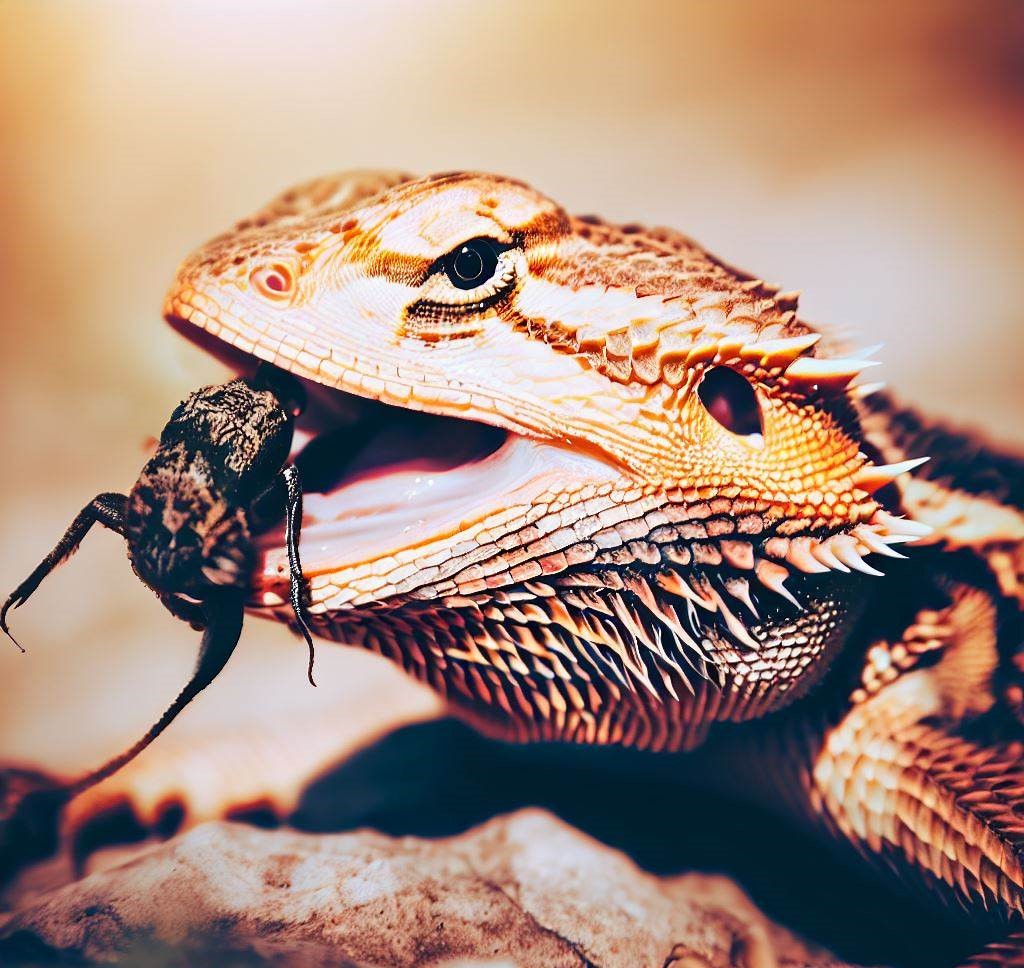
The diet of a bearded dragon is diverse. These fascinating creatures are omnivores, meaning they eat both plants and animals. Bearded dragons munch on a range of insects, fruits, and vegetables in the wild.
But in captivity, their diet needs a careful balance. You can include Various leafy greens, brightly colored vegetables, and a good helping of insect protein.
The balance of these food groups shifts as your dragon grows. When bearded dragons are young (under 1 year), they need more protein for growth, which should come from about 70% insects and 30% nutritious fruits and vegetables.
But when they become adults (older than 1 year), their diet must shift to 20% protein from insects and 80% from fruits and vegetables. By understanding this, you can help your bearded dragon live a healthy life.
Assessing Stink Bugs as Potential Food
Introducing stink bugs to your bearded dragon’s diet requires careful consideration. Stink bugs got their name due to their ability to release an unpleasant odor as a defense mechanism. This odor comes from a chemical that these insects produce. If a bearded dragon ingests this chemical, it could lead to health issues.
Another important aspect to consider is the stink bug’s diet. These insects eat from various plants, some of which might be sprayed with pesticides. If the stink bugs ingest these chemicals, they can pass them on to your bearded dragon. The pesticides could lead to health problems for your pet.
These potential health risks make stink bugs a less-than-ideal food choice for bearded dragons. There are many other insects that serve as healthier and safer options for your bearded dragon’s diet.
Always remember to consult a reptile vet or an experienced breeder before introducing any new food into your bearded dragon’s diet.
So, Can Bearded Dragons Eat Stink Bugs?
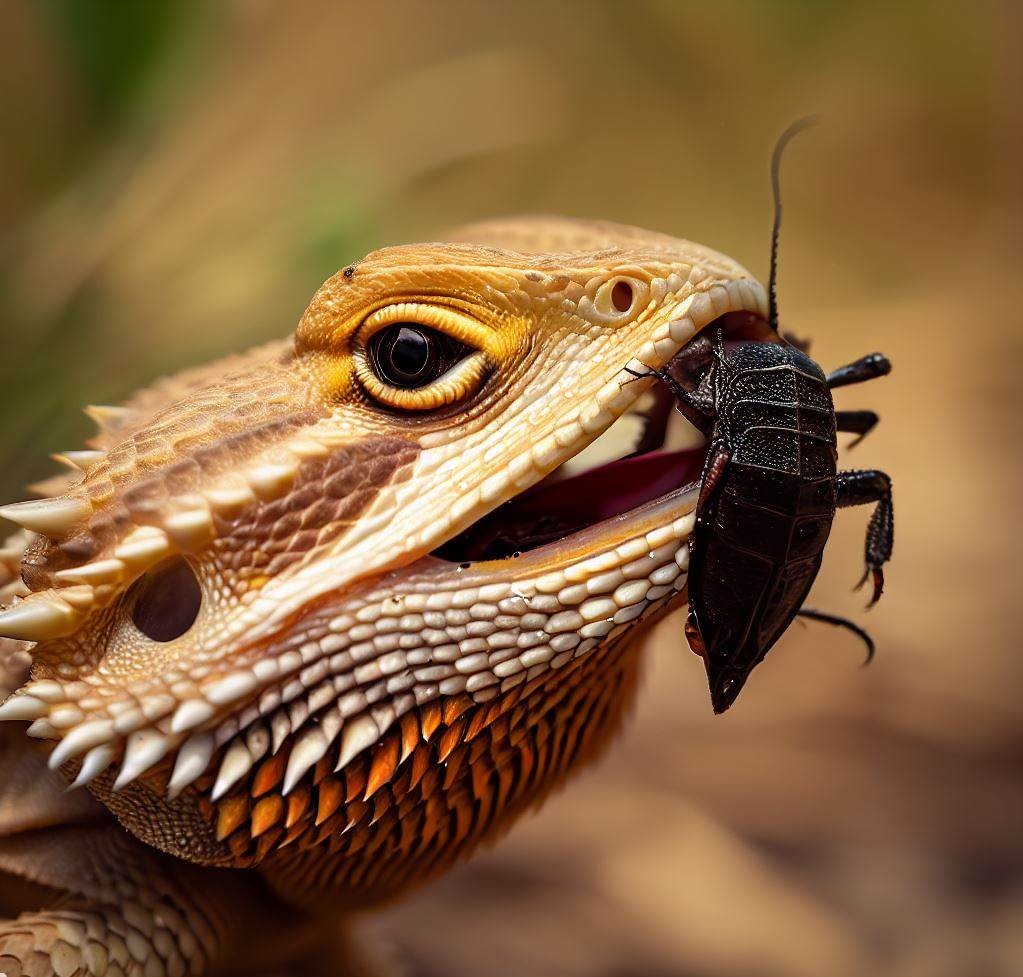
The answer to your question “Can bearded dragons eat stink bugs” is Yes. Bearded dragons can eat stink bugs but occasionally. It’s not recommended to make them a regular part of their diet.
As a responsible pet owner, you should assess the potential risks against the specific stink bug species and their nutritional contributions.
Nutritional Value of Stink Bugs for Bearded Dragons
Stink bugs can offer your bearded dragon a fair amount of protein and nutrients. But their potential to produce defensive chemicals can put your dragon at risk. Stink bugs can appear less attractive than other dietary options due to these potential health hazards.
Stink Bug Species That Are Safe to Eat
It’s crucial to clarify that some species of stink bugs pose less risk to bearded dragons than others. Here are some species to consider:
- Brown Marmorated Stink Bug (Halyomorpha halys): This bug comes from Asia. It is now in many places, including the United States. It does not make a lot of harmful chemicals. This makes it a better choice for your bearded dragon.
- Spined Soldier Bug (Podisus maculiventris): This bug does not make many chemicals for defense. It uses its spikes instead. This means your bearded dragon is less likely to eat harmful chemicals.
- Green Stink Bug (Chinavia spp): This bug is green. It does not smell as bad as other stink bugs. This means it doesn’t make as many harmful chemicals. This bug might be a safer choice for your bearded dragon.
- Florida Predatory Stink Bug (Euthyrhynchus floridanus): This bug eats other bugs. It does not eat plants. This means it is less likely to have harmful plant chemicals on it. This could make it a safer choice for your bearded dragon.
- Red-Shouldered Stink Bug (Thyanta spp): This bug has red markings. It does not smell as bad as other bugs. This means it doesn’t make as many harmful chemicals. This bug could be a safer choice for your bearded dragon.
Remember that while these species might be safer, introducing stink bugs to your bearded dragon’s diet should always be done with utmost care.
It is crucial to consult with reptile experts, such as veterinarians or experienced reptile breeders, who can provide you with specific guidance.
Potential Benefits of Feeding Stink Bugs
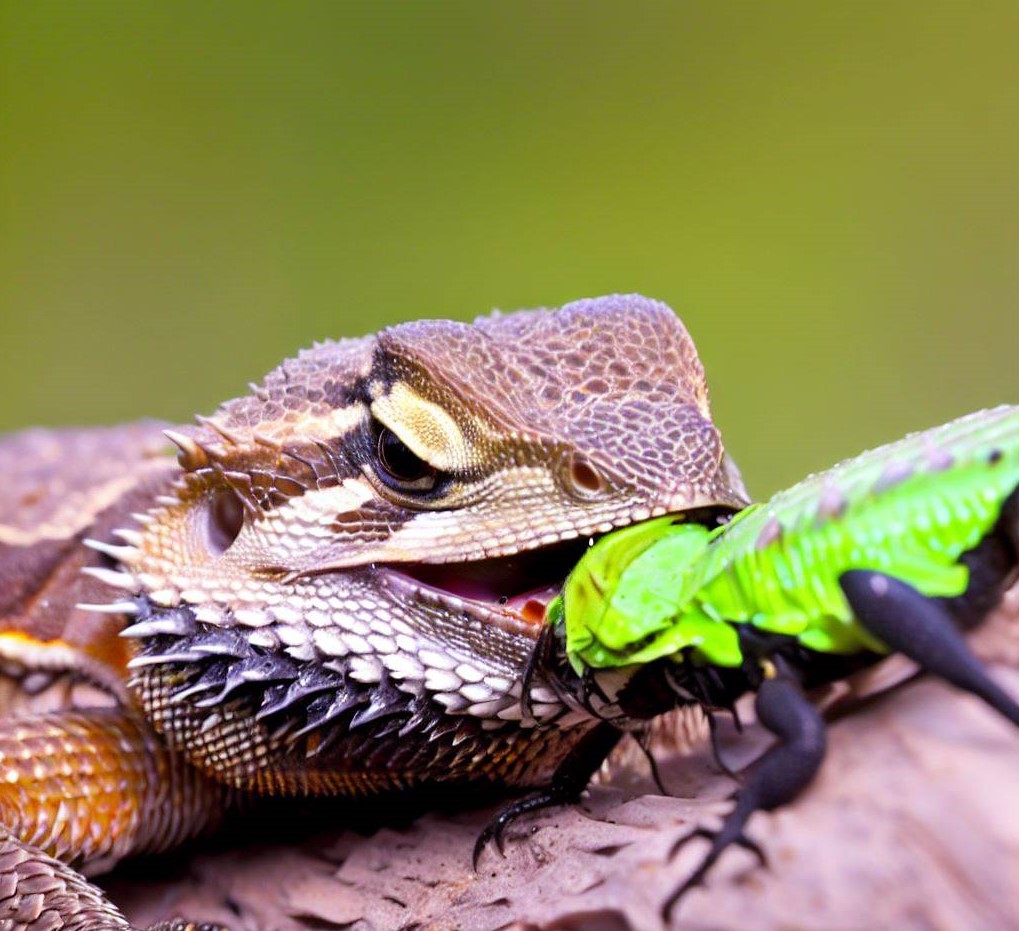
Stink bugs might not be a staple food for bearded dragons, but they can be a welcome change in your pet’s diet. These insects add variety and stimulate your pet’s natural instincts.
But it’s important to consider these benefits against potential risks before introducing stink bugs into your pet’s diet.
Nutritional Variety
Each type of insect offers a different nutrient profile, and stink bugs are no exception. They can add to the nutritional diversity of your bearded dragon’s diet, providing a different mix of protein, fats, and other essential nutrients.
But, while diversifying is beneficial, it’s crucial to balance it with your pet’s nutritional needs.
Enrichment and Behavioral Stimulation
Bearded dragons, in their natural habitat, consume a wide range of insects. Providing them with stink bugs may evoke their hunting instincts, encouraging their natural behaviors. This kind of behavioral stimulation enhances their mental health, ensuring your pet is physically and mentally active.
Sensory Stimulation
Stink bugs, true to their name, emit a distinctive odor. This unique smell can create new sensory stimulation for your bearded dragon, enhancing its exploratory behaviors. These insects can thus serve as an enriching addition to your pet’s diet, encouraging their natural curiosity and feeding instincts.
Even though these benefits exist, focusing on your pet’s health is crucial. Stink bugs should never replace safer, more established diet choices. Always consult a vet or reptile expert before making any significant dietary changes.
Risks and Considerations of Feeding Stink Bugs
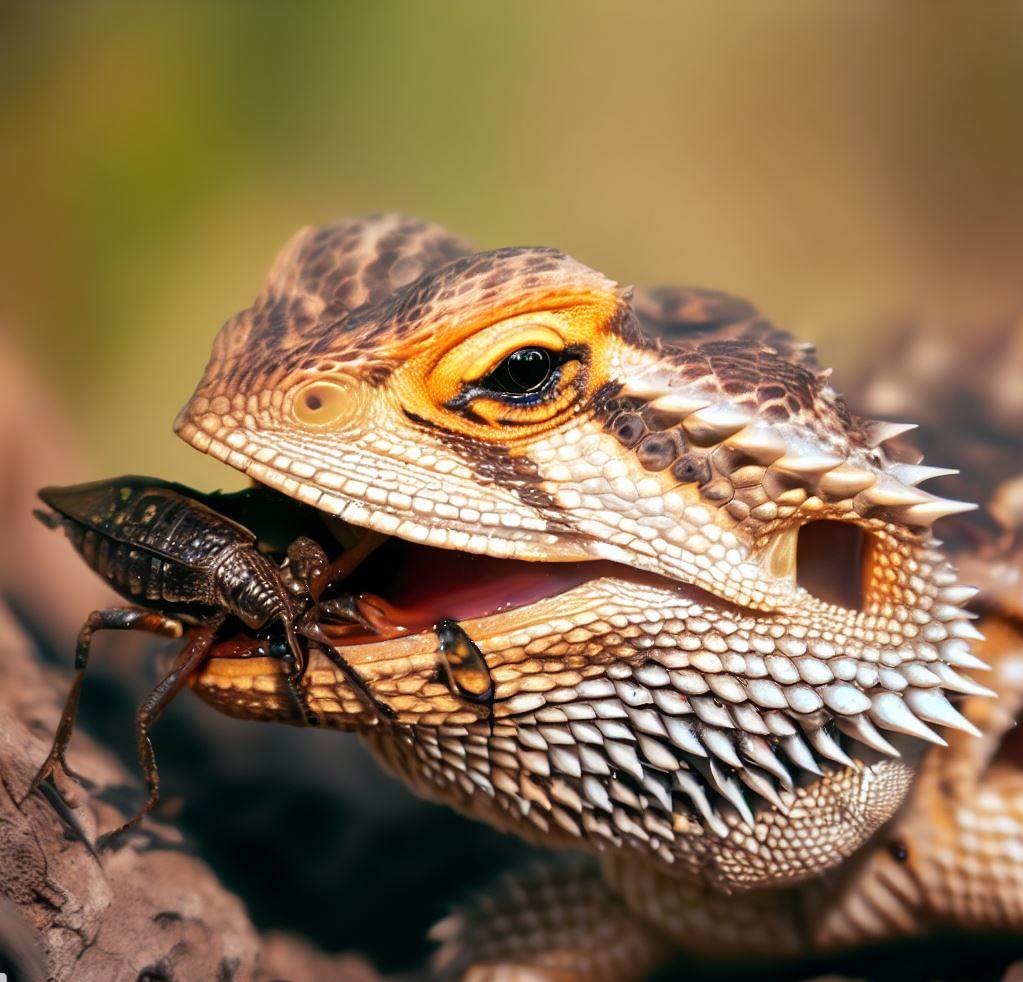
Various factors come into play when considering feeding stink bugs to your bearded dragon. Some factors can show serious health risks, while others can complicate sourcing and feeding methods. Let’s dive deeper into each of these.
The Threat of Toxicity
One primary concern with stink bugs is the toxin they produce. This defensive mechanism, harmless to humans, can affect bearded dragons negatively. Ingesting these toxins can lead to digestive issues, loss of appetite, and discomfort in bearded dragons.
So, always watch your pet’s reaction after introducing stink bugs into their diet.
The Risk of Pesticide Exposure
Being outdoor insects, stink bugs are often in contact with pesticides. Consuming these insects might inadvertently expose your bearded dragon to harmful chemicals, which can lead to health complications. So, it’s crucial to source your stink bugs from a reliable, pesticide-free environment.
The Possibility of Allergic Reactions
Like many living creatures, bearded dragons can also have allergies. Feeding stink bugs could potentially trigger an allergic reaction. This is why it’s critical to closely observe your pet when introducing new foods into its diet, stink bugs included.
The Danger of Nutritional Imbalance
A balanced diet is key to your bearded dragon’s health. Their diet should be a mix of fruits, vegetables, and insects. A balanced diet is key to your bearded dragon’s health. Their diet should be a mix of fruits, vegetables, and insects.
They should form a small part of your pet’s diet alongside fruits, vegetables, and other insects.
Sourcing Concerns and Challenges
Obtaining stink bugs safely and ethically can be challenging. Not all pet shops stock these insects, and sourcing from the wild has potential pesticide exposure risks. A safer alternative could be reliable online suppliers that offer captive-bred, pesticide-free feeder insects. This ensures your bearded dragon gets the nutrition without the associated risks.
Stink bugs can provide some dietary benefits for your bearded dragon. But they should not be the primary food source due to the risks and considerations involved.
Tips On Feeding Stink Bugs To Bearded Dragons
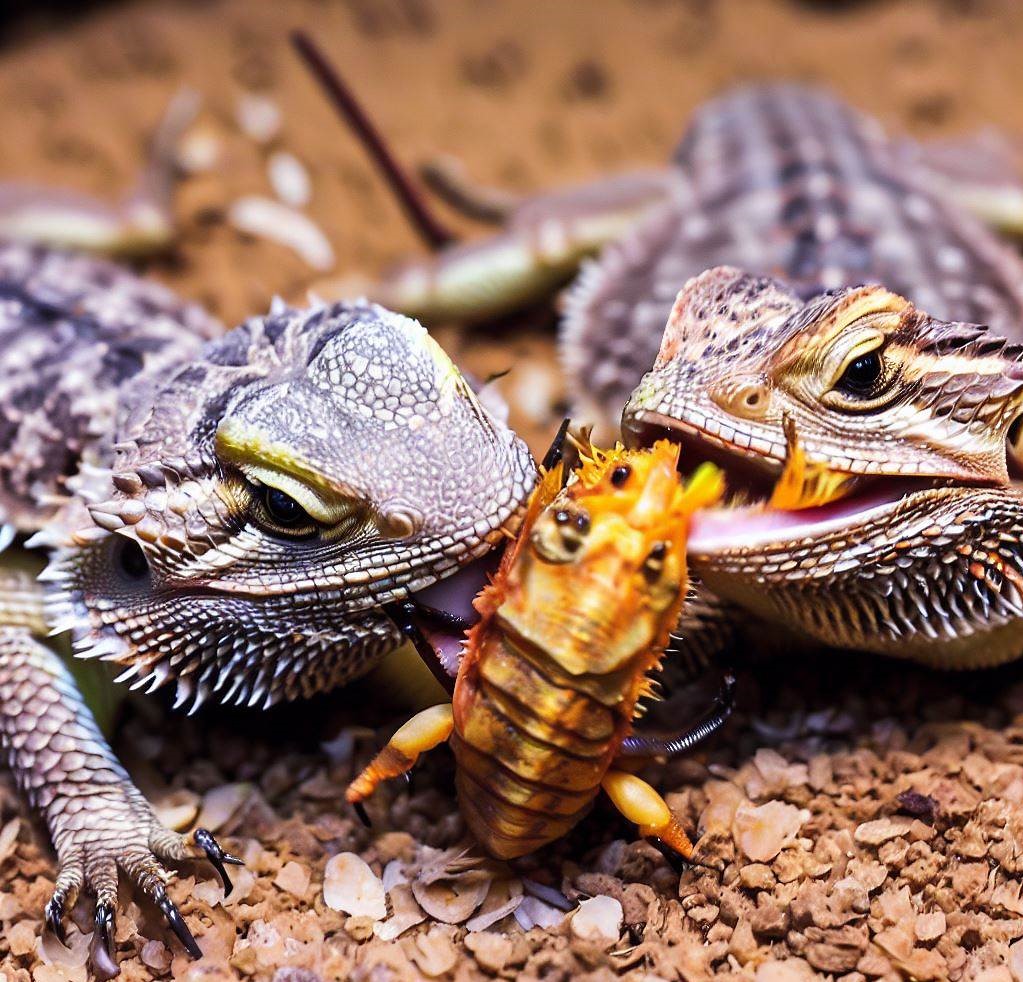
Delving into the arena of feeding stink bugs to your bearded dragon can feel like uncharted territory. To help you navigate, consider these expert tips stemming from a wealth of knowledge from seasoned reptile vets and lovers.
How Often Should You Feed Stink Bugs?
The frequency of feeding stink bugs to your bearded dragon should be a gradual process. Start by introducing one stink bug weekly, slowly progressing depending on your pet’s reaction. It’s important to observe the pet’s response, adapting the feeding frequency as required.
Remember that you should offer to stink bugs as an occasional treat in your bearded dragon’s diet rather than making them a regular part of their diet.
Best Practices for Preparing and Serving Stink Bugs
Preparation of stink bugs for your bearded dragon is straightforward yet requires attention to detail. First, choose live stink bugs and ensure they’re pesticide-free by rinsing them under cool water.
Offer the bugs live, as bearded dragons relish the chance to hunt. It’s crucial to observe your dragon’s reaction. If they seem uncomfortable with the bugs’ defensive behaviors, reconsider this feeding option.
Observing Bearded Dragon’s Response
An essential aspect of this feeding practice is carefully observing your bearded dragon post-feeding. Keep an eye out for any shifts in eating habits, demeanor, or physical condition.
Should there be any signs of discomfort or changes in behavior, halt the introduction of stink bugs immediately and seek advice from a vet. It’s vital to ensure the dragon’s health isn’t compromised.
Conclusion
As you introduce stink bugs to your dragon’s menu, keep a watchful eye on their reactions. Any changes in mood or behavior are clear signals to hit the brakes and seek guidance from a vet. After all, your dragon’s safety and well-being are of utmost importance.
Feeding stink bugs to bearded dragons may not be an everyday norm, but with careful steps and a pinch of adventurous spirit, it can be done. Just remember, each dragon is unique, so what works for one may not work for another. Always prioritize your dragon’s health and happiness above all else.
So, are you ready to embark on this culinary journey with your scaly companion? Get ready to explore new tastes and find the perfect balance for your dragon’s extraordinary diet. Happy feeding!
FAQs
Can bearded dragons eat any stink bugs?
No, not all stink bugs are safe for bearded dragons. Some species, such as Brown Marmorated Stink Bug and Green Stink Bug, are generally safer options, while others may carry toxicity.
Do bearded dragons like the taste of stink bugs?
The flavor preference varies among bearded dragons. Some might find stink bugs appealing, while others may not. Introduce them slowly to see if your pet dragon likes them.
What are some good insect alternatives to stink bugs for my bearded dragon?
Crickets, superworms, hornworms, mealworms, and roaches make great alternatives to stink bugs. They are generally safe for bearded dragons, are easy to find, and provide good nutritional value. Always feed insects from reliable sources to ensure they are free from pesticides.
Do lizards eat stink bugs?
Yes, some lizards eat stink bugs, but their chemical defenses discourage many lizards due due to their horrible taste and potential toxins.
Alina Hartley is a small-town girl with a ginormous love of bearded dragons. It all started with Winchester, a baby bearded who was abandoned at the shelter by his former owners because of a birth defect that caused one front leg to be shorter than the other. Alina originally went to the shelter looking for a guinea pig, but one look at Winchester and it was love at first sight. From that day on, Alina has dedicated her life to learning everything she can about bearded dragons. She loves helping new beardie parents start their incredible journey with these magnificent reptiles.
Follow her on:
LINKEDIN
TWITTER.
Read her latest articles HERE
Learn more about her HERE.

